Daniel Silver
CoordFlow: Coordinate Flow for Pixel-wise Neural Video Representation
Jan 01, 2025



Abstract:In the field of video compression, the pursuit for better quality at lower bit rates remains a long-lasting goal. Recent developments have demonstrated the potential of Implicit Neural Representation (INR) as a promising alternative to traditional transform-based methodologies. Video INRs can be roughly divided into frame-wise and pixel-wise methods according to the structure the network outputs. While the pixel-based methods are better for upsampling and parallelization, frame-wise methods demonstrated better performance. We introduce CoordFlow, a novel pixel-wise INR for video compression. It yields state-of-the-art results compared to other pixel-wise INRs and on-par performance compared to leading frame-wise techniques. The method is based on the separation of the visual information into visually consistent layers, each represented by a dedicated network that compensates for the layer's motion. When integrated, a byproduct is an unsupervised segmentation of video sequence. Objects motion trajectories are implicitly utilized to compensate for visual-temporal redundancies. Additionally, the proposed method provides inherent video upsampling, stabilization, inpainting, and denoising capabilities.
Pathways on the Image Manifold: Image Editing via Video Generation
Nov 25, 2024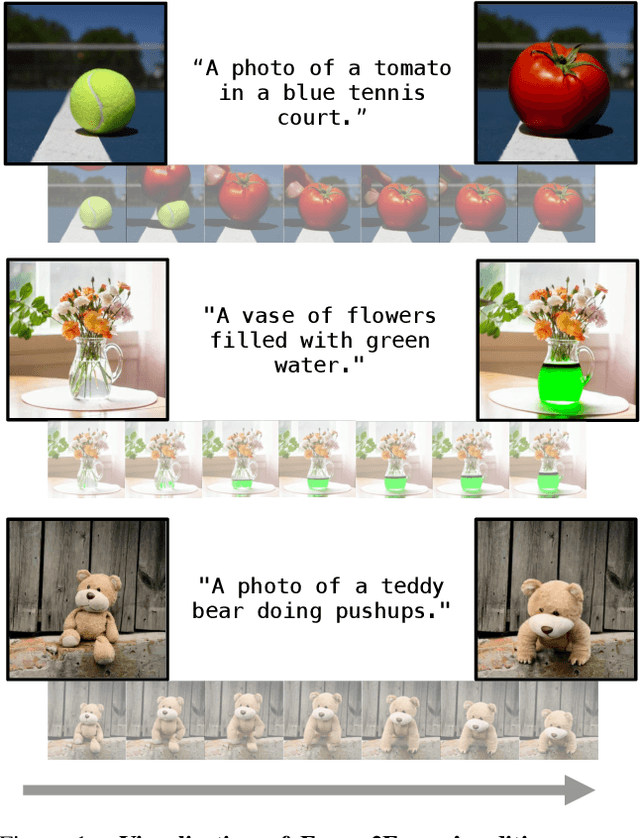
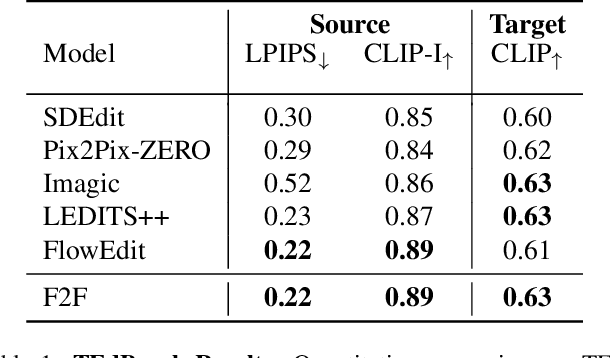
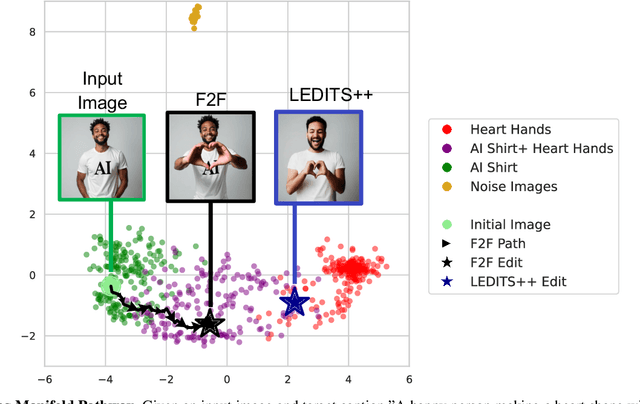
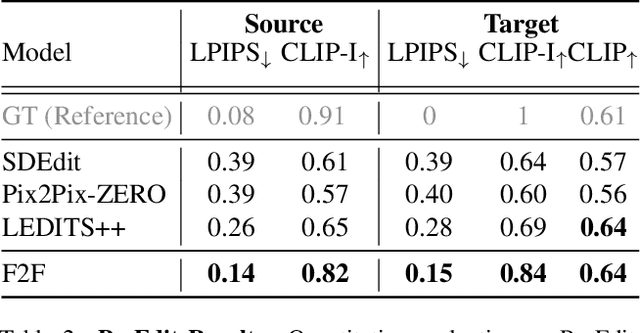
Abstract:Recent advances in image editing, driven by image diffusion models, have shown remarkable progress. However, significant challenges remain, as these models often struggle to follow complex edit instructions accurately and frequently compromise fidelity by altering key elements of the original image. Simultaneously, video generation has made remarkable strides, with models that effectively function as consistent and continuous world simulators. In this paper, we propose merging these two fields by utilizing image-to-video models for image editing. We reformulate image editing as a temporal process, using pretrained video models to create smooth transitions from the original image to the desired edit. This approach traverses the image manifold continuously, ensuring consistent edits while preserving the original image's key aspects. Our approach achieves state-of-the-art results on text-based image editing, demonstrating significant improvements in both edit accuracy and image preservation.
OrganiQ: Mitigating Classical Resource Bottlenecks of Quantum Generative Adversarial Networks on NISQ-Era Machines
Sep 29, 2024Abstract:Driven by swift progress in hardware capabilities, quantum machine learning has emerged as a research area of interest. Recently, quantum image generation has produced promising results. However, prior quantum image generation techniques rely on classical neural networks, limiting their quantum potential and image quality. To overcome this, we introduce OrganiQ, the first quantum GAN capable of producing high-quality images without using classical neural networks.
Qompose: A Technique to Select Optimal Algorithm- Specific Layout for Neutral Atom Quantum Architectures
Sep 29, 2024Abstract:As quantum computing architecture matures, it is important to investigate new technologies that lend unique advantages. In this work, we propose, Qompose, a neutral atom quantum computing framework for efficiently composing quantum circuits on 2-D topologies of neutral atoms. Qompose selects an efficient topology for any given circuit in order to optimize for length of execution through efficient parallelism and for overall fidelity. our extensive evaluation demonstrates the Qompose is effective for a large collection of randomly-generated quantum circuits and a range of real-world benchmarks including VQE, ISING, and QAOA.
Using Graph Neural Networks to Predict Local Culture
Feb 27, 2024

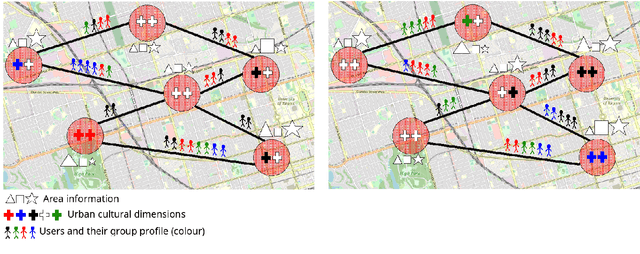
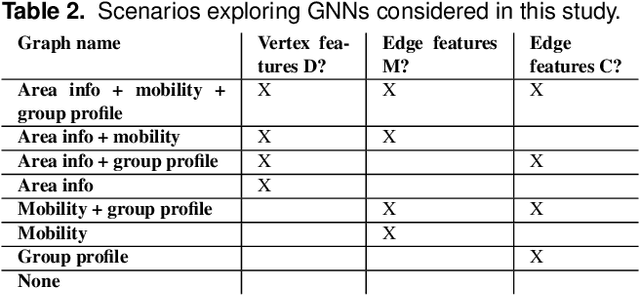
Abstract:Urban research has long recognized that neighbourhoods are dynamic and relational. However, lack of data, methodologies, and computer processing power have hampered a formal quantitative examination of neighbourhood relational dynamics. To make progress on this issue, this study proposes a graph neural network (GNN) approach that permits combining and evaluating multiple sources of information about internal characteristics of neighbourhoods, their past characteristics, and flows of groups among them, potentially providing greater expressive power in predictive models. By exploring a public large-scale dataset from Yelp, we show the potential of our approach for considering structural connectedness in predicting neighbourhood attributes, specifically to predict local culture. Results are promising from a substantive and methodologically point of view. Substantively, we find that either local area information (e.g. area demographics) or group profiles (tastes of Yelp reviewers) give the best results in predicting local culture, and they are nearly equivalent in all studied cases. Methodologically, exploring group profiles could be a helpful alternative where finding local information for specific areas is challenging, since they can be extracted automatically from many forms of online data. Thus, our approach could empower researchers and policy-makers to use a range of data sources when other local area information is lacking.
SLIQ: Quantum Image Similarity Networks on Noisy Quantum Computers
Sep 26, 2023Abstract:Exploration into quantum machine learning has grown tremendously in recent years due to the ability of quantum computers to speed up classical programs. However, these efforts have yet to solve unsupervised similarity detection tasks due to the challenge of porting them to run on quantum computers. To overcome this challenge, we propose SLIQ, the first open-sourced work for resource-efficient quantum similarity detection networks, built with practical and effective quantum learning and variance-reducing algorithms.
QUILT: Effective Multi-Class Classification on Quantum Computers Using an Ensemble of Diverse Quantum Classifiers
Sep 26, 2023



Abstract:Quantum computers can theoretically have significant acceleration over classical computers; but, the near-future era of quantum computing is limited due to small number of qubits that are also error prone. Quilt is a framework for performing multi-class classification task designed to work effectively on current error-prone quantum computers. Quilt is evaluated with real quantum machines as well as with projected noise levels as quantum machines become more noise-free. Quilt demonstrates up to 85% multi-class classification accuracy with the MNIST dataset on a five-qubit system.
MosaiQ: Quantum Generative Adversarial Networks for Image Generation on NISQ Computers
Aug 22, 2023Abstract:Quantum machine learning and vision have come to the fore recently, with hardware advances enabling rapid advancement in the capabilities of quantum machines. Recently, quantum image generation has been explored with many potential advantages over non-quantum techniques; however, previous techniques have suffered from poor quality and robustness. To address these problems, we introduce, MosaiQ, a high-quality quantum image generation GAN framework that can be executed on today's Near-term Intermediate Scale Quantum (NISQ) computers.
 Add to Chrome
Add to Chrome Add to Firefox
Add to Firefox Add to Edge
Add to Edge